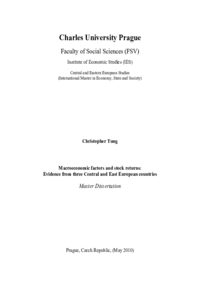Macroeconomic factors and stock returns: Evidence from three Central and East European countries
diplomová práce (OBHÁJENO)

Zobrazit/
Trvalý odkaz
http://hdl.handle.net/20.500.11956/24427Identifikátory
SIS: 149568
Katalog UK: 990017095010106986
Kolekce
- Kvalifikační práce [19752]
Autor
Vedoucí práce
Oponent práce
Dědek, Oldřich
Fakulta / součást
Fakulta sociálních věd
Obor
Středoevropská a východoevropská studia
Katedra / ústav / klinika
Katedra ruských a východoevropských studií
Datum obhajoby
23. 6. 2010
Nakladatel
Univerzita Karlova, Fakulta sociálních vědJazyk
Angličtina
Známka
Velmi dobře
Klíčová slova (česky)
Visegrádská skupina, makroekonomické faktory, teorie arbitrážního stanovení ceny, měnové kursy, průmyslová výroba, exportKlíčová slova (anglicky)
Visegrad, macroeconomic factors, arbitrage pricing theory, foreign exchange rates, industrial production, germany, exportsThis dissertation deals with the links between stock market returns and foreign exchange rates, industrial production and exports to Germany in three Central and East European countries (the Czech Republic, Hungary and Poland). The main questions addressed are: "Do macroeconomic factors related to foreign exchange rates and industrial production affect stock market returns in the Visegrad-3? And what is the impact of exports to Germany on those stock returns?" This analysis makes use of panel-data and the Arbitrage Pricing Theory (APT) to produce results. Firstly, foreign exchange rates are found to have a negative effect on stock returns. However the divergence in currency returns between the three countries means that the overall effect may be due to some factors that are not accounted for in this analysis. Secondly, there is a positive, but lagged, association between industrial production and stock returns. Thirdly, exports to Germany from the region are also found to have a positive impact on the stock returns of the Visegrad-3. Finally, there is divergence among the three countries with respect to the relationship between the macroeconomic factors and stock returns. Poland and Hungary are seen to exert a significant amount of influence over the region's stock markets.
